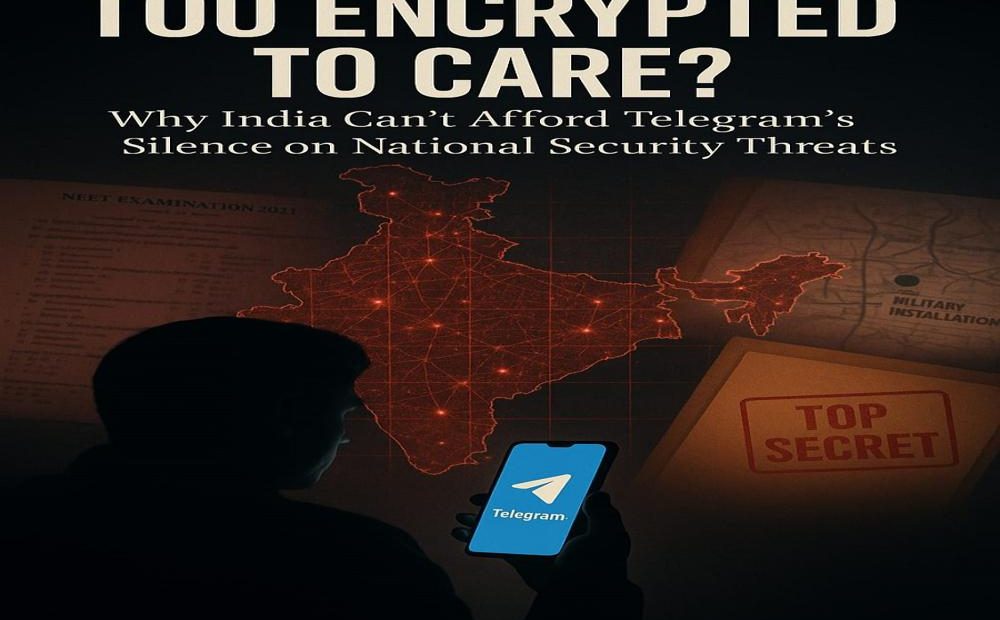
Too Encrypted to Care: Why India Must Consider Banning Telegram Before It’s Too Late
In the digital age, the boundary between privacy and national security has never been more precarious. Platforms that promise encryption and user freedom have, time and again, become safe havens for criminals, fraudsters, and even foreign agents. India, like many other nations, faces a growing dilemma — whether to continue tolerating platforms that claim neutrality but functionally enable lawlessness. Telegram, the messaging platform known for its secret chats and channel anonymity, sits squarely at the center of this crisis.
Telegram’s operational and legal architecture is designed for evasion, not cooperation. It is legally registered in the British Virgin Islands, a jurisdiction infamous for secrecy and resistance to global law enforcement cooperation. Operationally, it runs out of Dubai under the entity Telegram FZ-LLC, again placing it outside the direct reach of Indian regulators or law enforcement authorities. Unlike Meta or Google, which have registered offices and appointed compliance teams in India, Telegram exists here as an unregulated, foreign digital squatter — freely accessible to over 150 million users, yet immune to the responsibilities that should accompany such access.
Despite being legally obligated under India’s Information Technology (Intermediary Guidelines and Digital Media Ethics Code) Rules, Telegram’s compliance is tokenistic at best. It has appointed a grievance officer and nodal contact, but without a local office or meaningful legal presence, these appointments amount to little more than window dressing. Law enforcement officials have repeatedly expressed frustration at Telegram’s evasive cooperation, often receiving only bare-minimum metadata such as login IPs — which, in most cases, are either obsolete or masked via VPNs.
The Trail of Crimes and Telegram’s Evasive Cooperation
The list of crimes in India facilitated by Telegram is not hypothetical — it is extensive, real, and deeply troubling. From national-level exam paper leaks and financial frauds to espionage and terror-linked propaganda, Telegram has consistently surfaced as the preferred tool for those wishing to operate in the dark.
Consider the case of Jyoti Malhotra, a travel vlogger turned alleged spy, who used Telegram and WhatsApp to relay sensitive military information to Pakistan’s intelligence handlers. Her communications reportedly included videos from sensitive areas like Pahalgam, just weeks before the deadly attack that killed Indian security personnel. Telegram’s role in facilitating this cross-border intelligence network is not peripheral — it was a core communication channel, chosen precisely because of its anonymity and non-cooperation with Indian probes.
The NEET-UG exam paper leak scandal further exposed Telegram’s misuse. Question papers were allegedly sold openly in Telegram groups, some boasting thousands of members. The Ministry of Home Affairs and multiple state cyber cells initiated investigations, but Telegram’s response was as expected — slow, evasive, and partial. Authorities could not trace the admins, retrieve deleted messages, or halt the dissemination of illegal content in real time.
Telegram has also been central to numerous “task-based job scams”, child pornography rings, online betting operations, and ISIS-inspired propaganda channels. And yet, when Indian agencies seek data or traceability, they are stonewalled by a platform that hides behind its “neutrality” while offering no assistance of substance.
The Delhi Police’s Cybercrime Unit has explicitly stated that Telegram only provides IP addresses — often outdated or masked — with no message logs, user identity verification, or real-time cooperation. In one internal report, an officer described Telegram’s help as “technically a reply, but practically a denial.” For a platform operating in a country with over a billion people, this is not just negligence — it’s contempt.
Legal Dead-Ends, Global Comparisons, and the Case for a Ban
India is not without legal tools, but they are grossly inadequate when the adversary is designed to dodge them. Telegram, with its corporate shell in the British Virgin Islands and headquarters in Dubai, does not fall directly under Indian jurisdiction. There is no local office to raid, no board to summon, and no executive to hold accountable. Mutual Legal Assistance Treaties (MLATs) take months to process — a luxury law enforcement cannot afford during active threats or terror plots.
Even when approached through diplomatic channels with the UAE, success has been uncertain and limited. Telegram’s posture has been one of polite deflection — enough to show procedural formality but never actual cooperation. And herein lies the danger. National sovereignty means little if foreign entities operating within our borders refuse to play by our rules, and yet are allowed to continue profiting from our market.
India is not alone in confronting this problem. China banned Telegram outright for refusing to comply with its surveillance regime. Russia, despite being its country of origin, blocked Telegram for nearly two years due to non-compliance with national security directives. Iran and Indonesia have similarly restricted the app at various points for illegal content dissemination. None of these countries were apologetic — and none faced catastrophic backlash.
India, on the other hand, continues to tolerate a platform that facilitates espionage, enables fraud, undermines exams, and ignores legal summons — all while pretending to be a passive conduit. This isn’t a debate about privacy anymore. It’s about digital impunity — and how long India is willing to let it fester.
The solution is not complex. The Indian Government must either force Telegram to establish full legal and physical compliance within India or initiate proceedings to restrict or ban access to the platform under the Information Technology Act, Section 69A — just as was done with TikTok, PUBG, and WeChat.
Conclusion: Security Over Silicon-Wrapped Arrogance
India is a democracy — not a playground for anarchist apps. No platform, no matter how popular or encrypted, should have the luxury of operating in a legal vacuum. Telegram’s persistent non-compliance, evasiveness, and role in serious national security threats are reason enough to act. The time for polite notices and procedural patience is over.
If a platform refuses to cooperate with investigations into espionage, terrorism, and organized fraud, it must forfeit the right to operate within India. The question is no longer whether Telegram should be banned — the real question is: how many more lives, exams, or secrets must be compromised before it is?


















